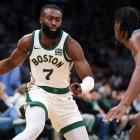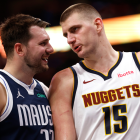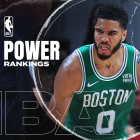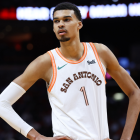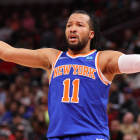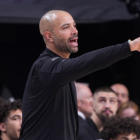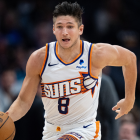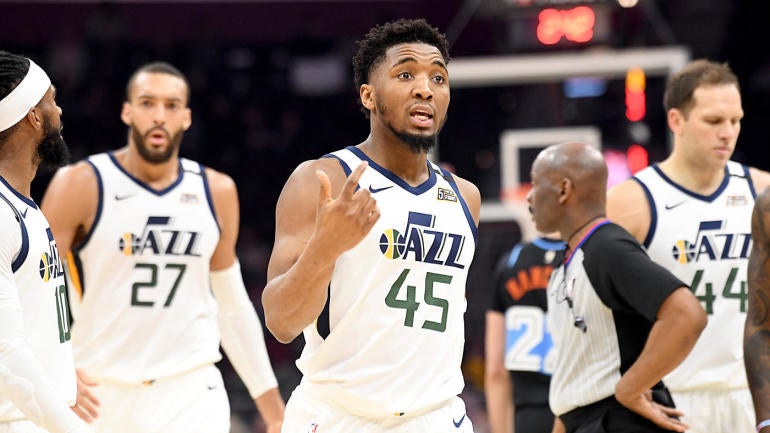
The 2019-20 Utah Jazz were an admission of defeat, a rejection of the pillars that made their previous selves such a dangerous regular-season team. Back-to-back postseason defeats at the hands of James Harden led to an organizational priority shift. No longer would the Jazz rely on jumbo-sized defensive lineups and internal development. The 2019-20 Jazz were perhaps the most aggressive in franchise history.
Mike Conley was perhaps the most celebrated veteran the Jazz have ever added, a theoretical mentor and complement to Donovan Mitchell that would give Utah one of the NBA's most explosive backcourts. Bojan Bogdanovic was the most expensive external free-agent signing in Jazz franchise history. The space to sign him was cleared by letting go of Utah mainstay Derrick Favors. The plan was clear: After two years of betting on a dominant, drop-coverage-based defense that came up short in the postseason, the Jazz wanted to win with offense.
To their credit, they improved from No. 14 to No. 9, but fell from No. 2 to No. 13 on defense. For six games against Denver, they couldn't get a stop, and in the seventh, they couldn't buy a bucket. Clearly, the proper balance wasn't struck. The 2020 offseason was designed to rectify that, to walk back those defensive sacrifices without giving up the critical offensive gains Bogdanovic and Conley generated. Favors returned for the mid-level exception. Fellow defensive stalwart Shaquille Harrison joined him. Utah's eight most-used players are all returning.
The Jazz are having their cake, and eating it, too, managing essentially to add Bogdanovic for the mere price of one year without Favors. The presence of both creates a mishmash as enticing as it is awkward. Within this roster lies the bones of Utah's older teams and the core of the new one it built only a year ago. How they manage those dueling styles is going to go a long way in determining how far the Jazz go this season. They are jacks of all trades, but are they masters of none?
Taking the temperature
Jazz believer: Why are we concerning ourselves with questions about roster construction anyway? Donovan Mitchell is a superstar now! He averaged 36 points per game in a playoff series. Kobe Bryant never even did that! If Mitchell is an MVP candidate, everything else is moot. The Jazz are championship contenders based on that jump alone.
Jazz skeptic: Donovan Mitchell averaged 36 points per game against the No. 16 defense in the NBA missing its two best perimeter defenders. Kobe might average 66 points if he could hunt Michael Porter Jr. in pick-and-roll for a whole series like Mitchell did. It's not exactly a coincidence that Mitchell shot 9 of 22 in Game 7 of that series, when Gary Harris had returned and played 26 minutes. Nothing Mitchell did in the regular season suggests he's ready to leap into the MVP conversation.
If anything, Conley's presence hampers his development. Why are the Jazz even bothering with the Conley experiment? He's 33, coming off his worst season as a pro and spends possessions that could otherwise be allocated to Mitchell (or Joe Ingles!) They tried and failed to bench Conley once last season. It seems as though they're in it for the long haul with him as a starter. Why is that encouraging for Mitchell or the team?
Jazz believer: Because lineups featuring both were actually quite good? Utah's starting five outscored opponents by over 10 points per 100 possessions, per Cleaning the Glass, and lineups featuring Mitchell and Conley were a steady four points better than opponents per 100. Even in his present state, Mitchell is a scorer first. Having an experienced floor general to grab the wheel when teammates need to be worked in gives Mitchell a valuable set of training wheels when he needs them. If it turns out that he doesn't, the Jazz can tweak their lineups accordingly.
That is the major selling point here. Lineups featuring Gobert and Favors allowed only 101 points per 100 possessions during the 2019-20 season. Lineups featuring Gobert and Bogdanovic last season scored a blistering 115.7 points per 100. Few teams in basketball can more easily cycle between offense-centric and defense-centric lineups. The Jazz can go big against teams like the Lakers and small against opponents like the Warriors. No single matchup is going to phase them.
Jazz skeptic: You're too focused on the biggest Lakers. The Jazz might have an answer for Anthony Davis, but who on Earth are they going to throw at LeBron James? Royce O'Neale? He's 6-4. Houston tried that with Eric Gordon. It didn't go well. When a younger Bogdanovic tried his hand at the assignment, LeBron averaged 34 points on 55 percent shooting in the 2018 playoffs. The opportunity cost of that versatility was the chance to add someone who could credibly cover the game's best players. LeBron is going to destroy them. So are Kawhi Leonard and Luka Doncic.
That's the folly of the Favors signing. It places outsize importance on things that just aren't that important. Utah's defense hardly declined when Gobert went to the bench last season. A high-end backup center is a luxury. Yet Utah's 23rd-ranked bench scoring remains an issue, and the lack of wing depth hasn't been addressed.
Jazz believer: Is there a better reserve wing in basketball than Joe Ingles?
Jazz skeptic: If he's going to continue to shoot below league average on 3-pointers in games that he doesn't start? Absolutely! That brings us to the core question here. The Jazz have eight primary rotation players and no idea how to align them. Neither Ingles nor Conley seems comfortable coming off the bench, and Favors hasn't done so in years. We don't know who their five best players are. There's time to figure that out, but the Jazz never found a definitive answer last season.
Jazz believer: Of course they didn't. Conley was adjusting to a drastically different sort of roster. He was used to running the offense in Memphis, then he had to defer to Mitchell in Utah. His former pick-and-roll partner, Marc Gasol, never left the floor. Gobert's pick-and-roll value is derived from finishing lobs. It took Conley most of the season just to find his bearings. Now that he has, judging him, and subsequently, the rest of the roster, becomes substantially easier.
Jazz skeptic: That doesn't change the fact that Conley's 33. This is a surprisingly old roster, by the way. Bogdanovic is 31. Ingles is 33. Favors is 29. Gobert is 28 and negotiating a contract extension. Good luck navigating that minefield, by the way. Gobert was frustrated over a lack of touches offensively last season, chipping away at his defensive value and his relationship with Mitchell. His game is based on athleticism and he's eligible for the supermax. Utah's options are overpaying him or making him angry. Neither bodes particularly well for this Jazz season.
Jazz believer: At a certain point, this becomes nitpicking. The Jazz got better on defense without sacrificing much on offense. If the Jazz maintain their No. 9 offensive ranking (no given, but not outlandish either) while sneaking back into the top 10 on defense, they are going to contend. Teams that reach the top 10 on both ends always do. There might be playoff-related holes to poke, but this is going to be a very strong regular-season team.
Eye on: Joe Ingles
As alluded to, Ingles was a completely different player as a starter last season than he was as a reserve, averaging 3.2 more points, two more assists and shooting over nine percent better from behind the arc when he opened games. Ingles is a rhythm player, a secondary ball-handler that likes to mix in pick-and-rolls with his off-ball work. He's struck that balance with Mitchell.
Doing so alongside Conley or Jordan Clarkson is apparently more difficult, but Ingles is almost certainly going to come off the bench this season. If he can maintain his effectiveness, Utah's bench-scoring issues are solved. If he can't? Expect a year filled with more uncomfortable lineup shuffling.














